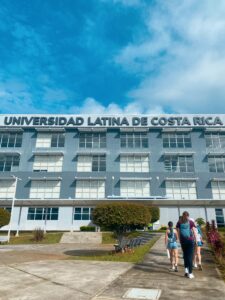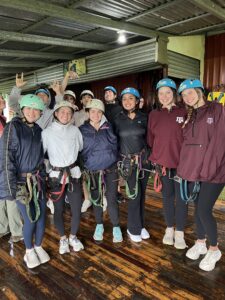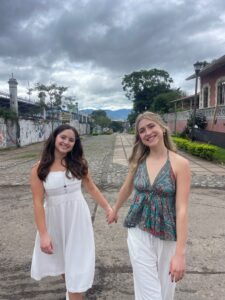This winter break, I had the incredible opportunity to travel to Costa Rica with Texas A&M Mays Business School. It was an unforgettable experience where I got to practice my Spanish, learn about business practices in a Latin American country, and immerse myself in a new culture. One of the most unique parts of the trip was staying with a Costa Rican family on my own. During the day, I spent time with my group of 18 other students, our professor, Ms. Phinney, and our program coordinator, Andrea.
Studying abroad here was eye-opening. We covered everything from Costa Rica’s macroeconomy to its healthcare system, taxes, company sales strategies, and marketing techniques. I learned that Costa Rica’s economy is closely tied to the U.S., so its success often depends on how well the U.S. is doing. Many Costa Ricans follow U.S. politics closely because of this. Unlike the U.S., Costa Rica doesn’t spend on the military, instead, they prioritize education, healthcare, and environmental protection.
One of the highlights of the trip was attending lectures at one of their public universities, where we learned about Costa Rica’s universal healthcare system. It’s public, tax-funded, and accessible to everyone, which is very different from the U.S. system, where private healthcare dominates, and there are larger differences in cost and access.
Another memorable experience was visiting the Toucan Rescue Ranch, a nonprofit focused on wildlife rehabilitation. We learned about their marketing strategies and how they tailor messages to different audiences. For example, U.S. donors are more likely to donate after connecting with the organization through emotional virtual tours or social media, while Costa Ricans prefer volunteering their time. On the other hand, Costa Ricans are culturally less donation-driven, but are more likely to volunteer their time, so the ranch’s marketing approach to locals is for opportunities for hands-on involvement.
Costa Rica’s respect for wildlife is also evident in their laws, such as how it is illegal to take selfies with wild animals. They truly make a collective effort to preserve their wildlife.
Another fascinating visit was to Britt Coffee, one of Costa Rica’s most well-known coffee companies. Despite operating in a relatively small space, Britt has optimized its production processes to expand internationally, with stores in airports in Miami and Mexico. One of the most inspiring aspects of Britt is its collaboration with the Toucan Rescue Ranch. For example, 50% of proceeds from a special coffee bag featuring a sloth design are donated to the ranch to support wildlife conservation.
Outside of the business aspects, my time with my host family was unforgettable. My host mom, “Mamatika,” and I had meaningful conversations about cultural differences between Costa Rica and the U.S. She explained that Costa Ricans value their privacy, which was very different from my experience of living in a sorority house with 50 girls, sharing bedrooms and bathrooms. She explained how family is important in Costa Rican culture, with elders often living with their children. This was true for my Mamatika, whose mom lived with us in the same home.
The biggest insight I gained from this trip was understanding Costa Rica’s peaceful way of life, respect for nature, and strong family values. It taught me the importance of slowing down, living simply, and being intentional about sustainability. My study abroad experience enhanced my cultural understanding and inspired me to move forward and think more globally in my personal and professional life.




